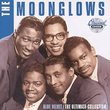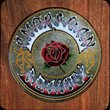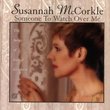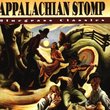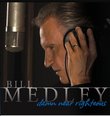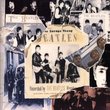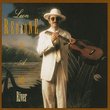| All Artists: Muddy Waters Title: The Complete Plantation Recordings Members Wishing: 2 Total Copies: 0 Label: Chess Original Release Date: 6/8/1993 Release Date: 6/8/1993 Genres: Country, Blues, Pop Styles: Classic Country, Chicago Blues, Delta Blues, Traditional Blues, Electric Blues, Acoustic Blues, Slide Guitar Number of Discs: 1 SwapaCD Credits: 1 UPCs: 076732934425, 076732934449 |
Search - Muddy Waters :: The Complete Plantation Recordings
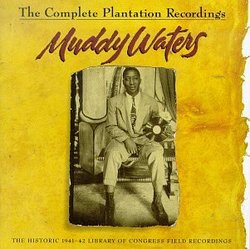 | Muddy Waters The Complete Plantation Recordings Genres: Country, Blues, Pop
Available for the first time on compact disc, these 13 tracks are culled from the historic 1941-1942 Library of Congress Field Recordings. — No Track Information Available — Media Type: CD — Artist: WATERS,MUDDY — Title: COMPL... more » |
Larger Image |
CD DetailsSynopsis
Product Description Available for the first time on compact disc, these 13 tracks are culled from the historic 1941-1942 Library of Congress Field Recordings. No Track Information Available Media Type: CD Artist: WATERS,MUDDY Title: COMPLETE PLANTATION RECORDINGS Street Release Date: 06/08/1993 Similar CDs
Similarly Requested CDs
|
CD ReviewsMuddy's Real Real Folk Blues Tony Thomas | SUNNY ISLES BEACH, FL USA | 01/15/2004 (5 out of 5 stars) "When Muddy Waters made the first recordings here, he was 26 or 27 and had not been playing regularly. He didnt own a guitar and had to borrow Alan Lomax's Martin. You see here your basic Delta and Mississippi blues in full blossom, by a man who was a great player if he could sound like this when he wasn't in practice. People look at Mississippi blues with a distorted mind thinking of it only through the stream of Robert Johnson, when the music and the tradition was much broader. In the interviews on this recording you can see how lame and ignorant at times the folklorists were, both white and black, Lomax and Work. But you also see a testament to Son House who taught Robert Johnson, Muddy, and a whole layer of bluesmen and who was such a great artist even in his revival 1960s that Muddy would make his band members keep quiet and play close attention when House performed with them at Newport and elsewhere. However, you also see his roots beyond this. We get to hear a good string band performance with Muddy Playing with fiddler Son Sims and a mandolin player in a blues fiddle band that was typical of what was going on at the time. Muddy explains his decision to start playing music was inspired by Sims and the string band with Sims and the mandolin player was the band he performed with when he got work. Neither Waters nor the liner notes let you know that Waters also played mandolin, and that when Muddy was a teenager in the 1930s, his favorite blues group was the fiddle band The Mississippi Sheiks. Years later, Muddy would explain he walked all day just to hear the Sheiks. Despite all this history, this is some good blues music to listen to,. More relaxed,and less intense, and of course less masterful than the Chess masterpieces Muddy began putting out in Chicago in the 1940s, but this is still a CD I put on my player with it set to keep replaying it because I want to hear it." Acoustic Mud wednightprayermeeting | Bellview, CA | 10/16/1999 (5 out of 5 stars) "These are the recordings that launched the legend. Traces of Robert Johnson and Big Bill Broonzy are all over these recordings. Features Muddy solo, and with his early juke-joint band, The Son Simms Four. Other than the music (essential to any Muddy fan,) another interesting aspect of these recording are the interview pieces conducted by Library of Congress archivist Alan Lomax. Muddy comes off as most shy and modest. He had no idea of the impact he would make just 6 years later. Very intriguing. Muddy's elecric 50's work influenced the likes of Chuck Berry and Bo Diddley, thereby creating rock and roll. Muddy is the father of all instruments electric. Ask Jimi Hendrix. Muddy was, and to me, still is the man." An invaluable look at Muddy Waters' early work. wednightprayermeeting | 09/15/1998 (4 out of 5 stars) "Before he became the phenomenon known as Muddy Waters, McKinley Morganfield was a sharecropper at Stovall's Plantation in Clarksdale, Mississippi who worked the soil for a living and played the blues to escape the rigors of his everday life. The Complete Plantation recordings brings us the rawest Muddy Waters yet, documented by Library of Congress folklorist Alan Lomax from 1941-42. Alot of the immediate appeal of the collection comes from hearing early versions of songs he would later record for the Chess brothers in Chicago. "I Can't be Satisfied" is here in its scorching embryonic state as "I Be's Troubled" as are two takes of "Country Blues" the haunting predecessor to "I Feel Like Going Home." Lomax asks Waters about his inspirations and compositional style in four interview tracks which tend to add more atmosphere than insight. The real gems here are five tracks of the Son Simms Four, a string band in which Waters played guitar (with Henry "Son" Simms on vocal and violin, Percy Thomas on Guitar and Louis Ford on Mandolin). Not only are they documents of Waters in an improvisational collaboration with other artists, and rare examples of authentic black string music, a frequently overlooked area of southern folklore, they are some great dance blues tunes. "Joe Turner," particularly, makes the dance origins of the blues readily apparent.Afficionados of Muddy Waters' know that his earlier his work, the more intense and raw the performance, Waters having unforntunately fallen into an overproduced 12-bar rut further into his career. While these performances are indisputably intense, feeling closer to the Mississippi Delta than their Chicago counterparts, they lack Waters' distinctive sound that was evident in his early Chess work; a sound that evolved from the tensions between his country roots and big city surroundings. It was that inimitable style which catapulted Waters onto blues' Mount Olympus, and which makes this collection slightly less essential than The Best of Muddy Waters (CHD-31268)or the other compilations of his early work on the Chess label. That said, once introduced to Waters' Chicago classics, "The Plantation Recordings" become required listening for anyone wanting know the infrastructure on which one of the most towering shadows in blues is built."
|

 Track Listings (22) - Disc #1
Track Listings (22) - Disc #1


